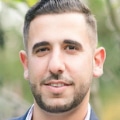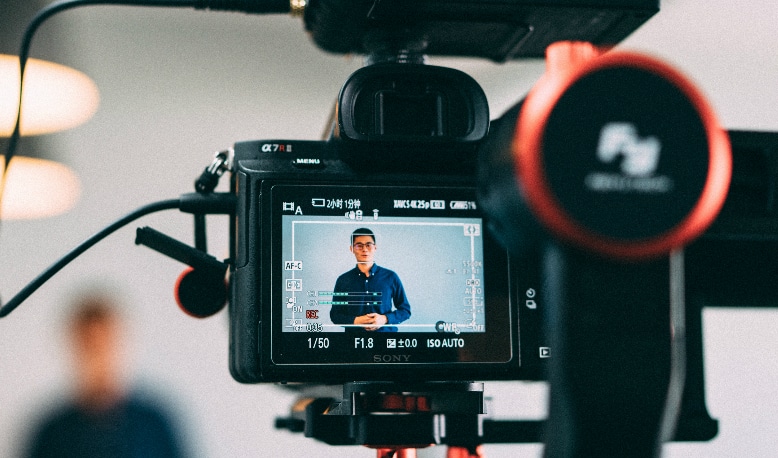Whether you’re looking to land your first job after graduation or you have decades of experience, almost everyone feels nervous before an interview. Learning to harness your nerves and present yourself confidently and authentically is key to making a great impression and ultimately getting the job.
Acing your interview requires preparation. Hult International Business School Career Development Advisor Eli Bohemond is passionate about setting our students up for success in a competitive job market. He’s also a member of the unique guild of Get Five Certified Career Coaches. Below Eli shares his comprehensive guide to holistic interview preparation to help you stand out in any interview that comes your way.
To interview is to share your life story in relevant bite-sized pieces. I’d like to ease your concerns by highlighting a few common misconceptions around interviewing.
1. The interviewer doesn’t care that you are nervous and doesn’t have a preconceived notion about what your answers should be. It’s your life, tell your story in your own words.
2. 98% of interviewees are worried about what they think the company wants to hear vs. the 2% who differentiate themselves with authenticity: showing the interviewer how they think. Stand out and show the company who you really are. The ones interviewing you are assessing their future colleague, the person they will be spending 1/3 of their life with for the foreseeable future, not some scripted work-bot.
3. You are dealing with human beings during both the application process and the interview. These people have families, dreams, emotions, and a complex life just like you. Go into the interview with an openness to human connection and approach the situation as a conversation rather than a one-sided interrogation.
Now, please leave your inhibitions here. Interviews are no place for self-doubt. Your goal is to walk into the interview with confidence, ready to leave a lasting impression that will lead to either the next round of the interview or better yet, an offer for employment.
“OK Eli, that is easy for you to say. You’re not the one in the hot seat.”
You are right. Simply asking you not to be nervous will never work. We need to lay the foundation to build your self-confidence through wholistic preparation. As Benjamin Franklin so eloquently said, “If you fail to prepare, you are prepared to fail.”
Preparation: Traditional Questions
Let’s start with some interview theory to demonstrate how you can practice strategically selling yourself using traditional questions. These are the standard opening questions and the ones that you will most likely field during your first phone call with the company or in the first 10 minutes of your in-person interview. The most popular questions are as follows:
Can you tell me a little about yourself?
This isn’t an open invitation to start detailing the narrative of your life beginning with your emergence from the womb, but rather an opportunity to give a relevant 1-minute to 1.5-minute pitch that captures the interest of your interviewer – showing them that who you are, ties in well to the company’s culture and mission. I’ve recorded a sample answer to this question assuming I am interviewing for an entry-level business development (sales) role with Tesla in their Energy Products division.
How did you hear about the opportunity and what do you know about the role?
This is your opportunity to take the interviewer on your application journey thus far. Mention where you came across the position, share the names of any contacts you may have at the company, and put into your own words the scope of work that is so conveniently listed in the job description. Glancing over the job description a few times before the interview is common sense, but is that enough to really give you a thorough understanding of what the job entails?
Run a google search on the company and job role, check glassdoor.com for employee reviews (taking into account that these are very biased reviews usually given by disgruntled employees), or search the company’s LinkedIn page or the LinkedIn profiles of individuals who are currently in a similar role at the company to see if there are any recently shared insights.
Why are you applying to our company and why should we hire you?
These questions are opportunities to showcase your knowledge of the company, while at the same time, differentiating yourself from your competition through your responses. You will want to verbally illustrate the relevance of their company and how it meshes with your core values.
Then, through a brief narrative, show the interviewer how you’ve exhibited skills relevant to the position with a focus on your unique approach and ending with your achievement (quantifiable if possible). Let’s use the same business development job example at Tesla and listen to how you could structure your response to these questions.
To learn more key interview preparation tips for Competency-Based (Behavioral) and Technical/Demonstration & Rationalization interviews, read the full article here.
Find out more about Hult’s business programs and how they prepare you for a global career download a brochure here


Eli is an international career development coach and altruist with 8+ years of industry expertise in management consulting, business development, entrepreneurship and higher education. To date, Eli has coached over 500 souls from over 80 countries on the navigation of major life decisions.
Hult offers a range of highly skills-focused and employability-driven business school programs including a range of MBA options and a comprehensive one year Masters in International Business. To find out more, take a look at our blog The world’s biggest brands join Hult on campus. Download a brochure or get in touch today to find out how Hult can help you to learn about the business world, the future, and yourself.


